Sales Intelligence Best Practices for 2023
Casey O'Connor
Sales intelligence is any data that sales reps and marketers use to make better connections with prospects, sell more effectively, and close more deals.
Or, put another way, sales intelligence is the processes or tools used to collect the data.
Sales reps rely on sales intelligence to deliver high-quality insights about leads that can help them identify best-fit accounts and, later, help inform their approach for each opportunity.
In this article, we’ll go over everything you need to know about sales intelligence, including what it is, how it can help your business, and the essential components of a solid sales intelligence process.
Here’s what we’ll cover:
- What Is Sales Intelligence?
- What Are the Benefits of Sales Intelligence?
- The Essential Components of Sales Intelligence
- The Role of CRM in Sales Intelligence
- How to Use Sales Intelligence to Win More Deals
What is Sales Intelligence?
Sales intelligence can be defined in two related ways:
- Any information that B2B sales teams collect to enhance their understanding of their prospects and make the sales process more effective and efficient for both parties, and
- The process of collecting, analyzing, and leveraging prospect, competitor, and/or market data to improve the sales process
Sales teams engage in sales intelligence because it helps add data to their decision-making processes. This, in turn, improves performance, helps close more deals, and ultimately boosts revenue.
Simply put, sales intelligence makes sales easier for businesses.
Sales intelligence can include a wide variety of information, including (but not limited to):
- Demographic, firmographic, and/or technographic information
- Verified email addresses and other contact information
- Buying signal insight and analysis
- Competitor analysis
- Market trends
- Additional insights (e.g., recent funding, mergers or acquisitions, recent changes in a prospect’s tech stack, etc.)
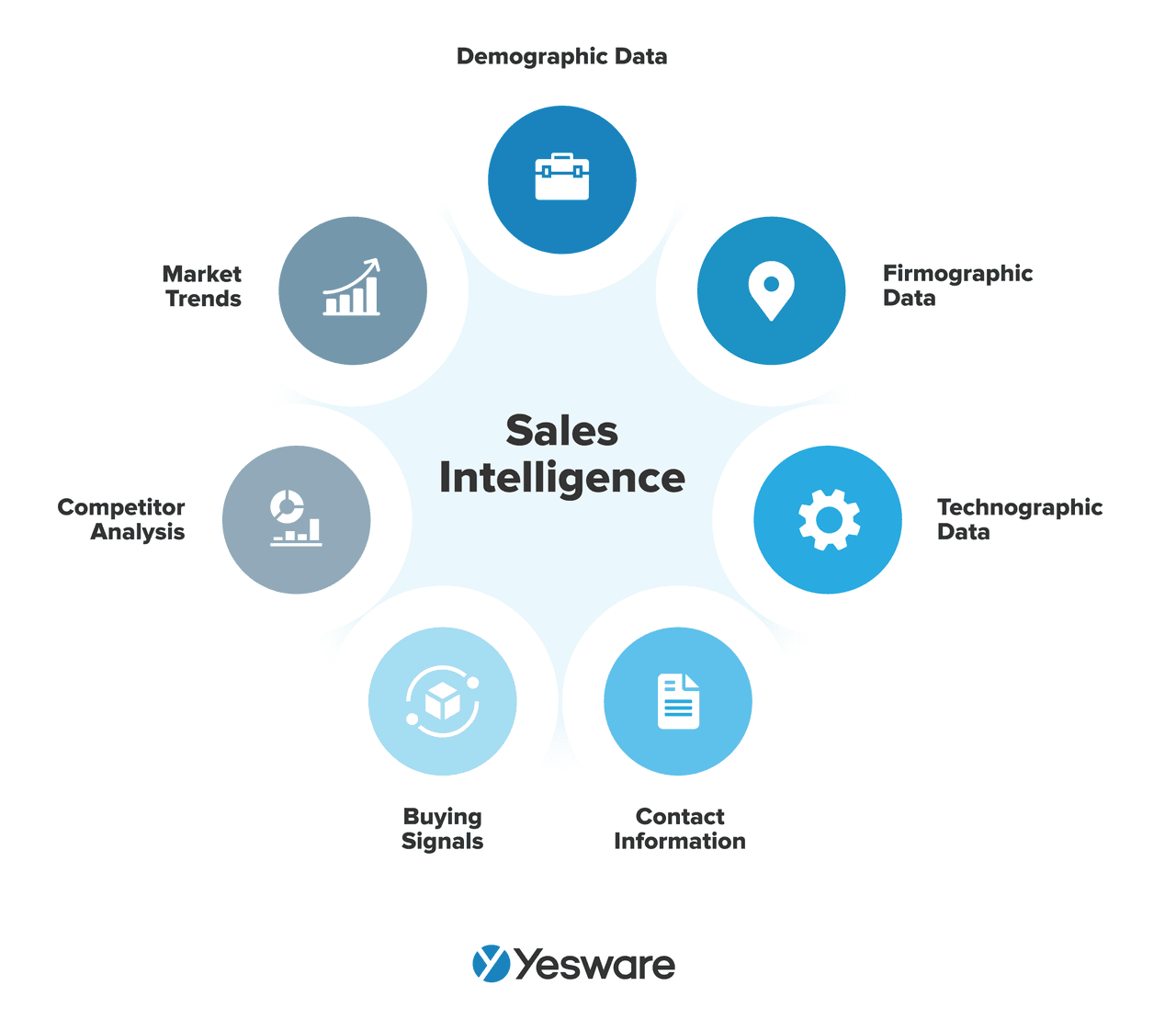 The more access sales reps have to relevant and up-to-date sales intelligence, the more timely and strategically they can reach out to highly qualified prospects.
The more access sales reps have to relevant and up-to-date sales intelligence, the more timely and strategically they can reach out to highly qualified prospects.
There are many ways to approach sales intelligence, ranging from manual (i.e., sales reps and marketers do their own research) to completely automated via impressively capable sales intelligence platforms. Software like this continuously crawls the web for the most accurate, up-to-date information and automatically updates the team’s B2B lead database.
Regardless of which sales intelligence method your team uses, it’s important to have standardized methods for collecting, tracking, and analyzing your B2B data so that it provides timely, relevant, and actionable insights.
What Are the Benefits of Sales Intelligence?
All teams need some form of sales intelligence. Without it, sales reps are essentially selling in the dark.
Sales intelligence has a number of tangible benefits. Part of what makes it so helpful for marketing and sales teams is that (when it’s done correctly) it organizes B2B sales data in a clear, easy-to-understand format that sales reps can use to take informed action.
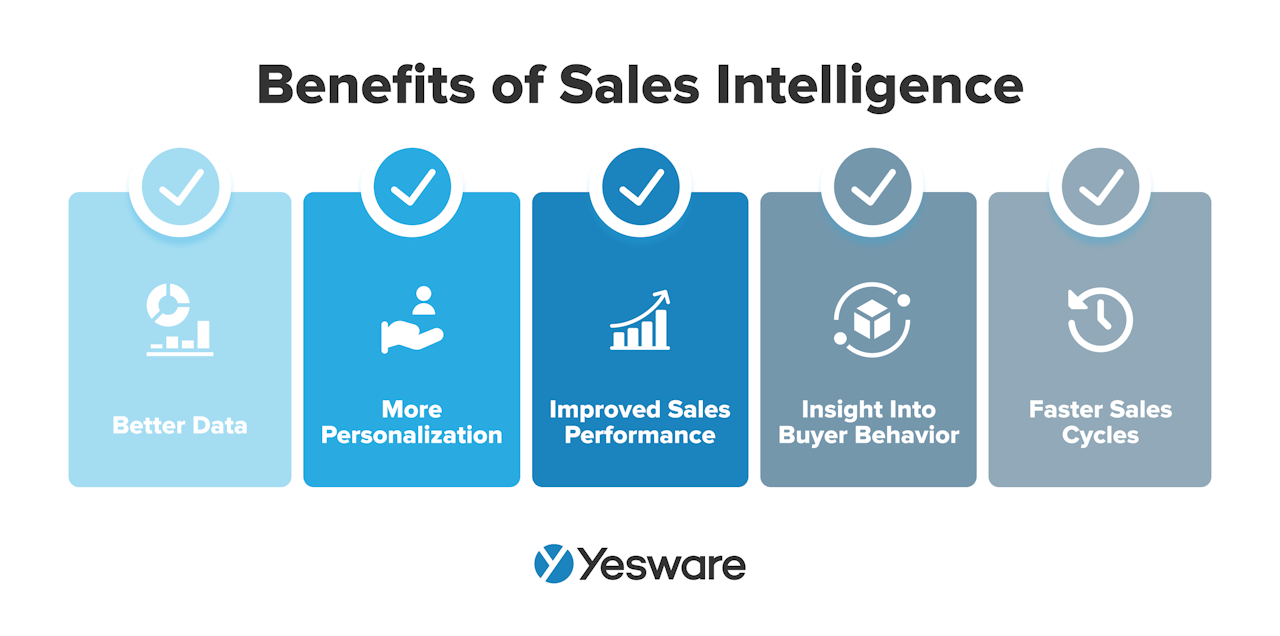
Better Data
Sales intelligence helps sales reps and marketers build a database of relevant, accurate, and up-to-date data. This is sometimes referred to as “clean data,” and is incredibly important for sales and marketing results.
Bad data costs companies over $3 trillion annually, and that’s not just from inadvertently using it during the sales cycle; even simply having to correct bad data — even if it never gets used in the field! — costs companies money.
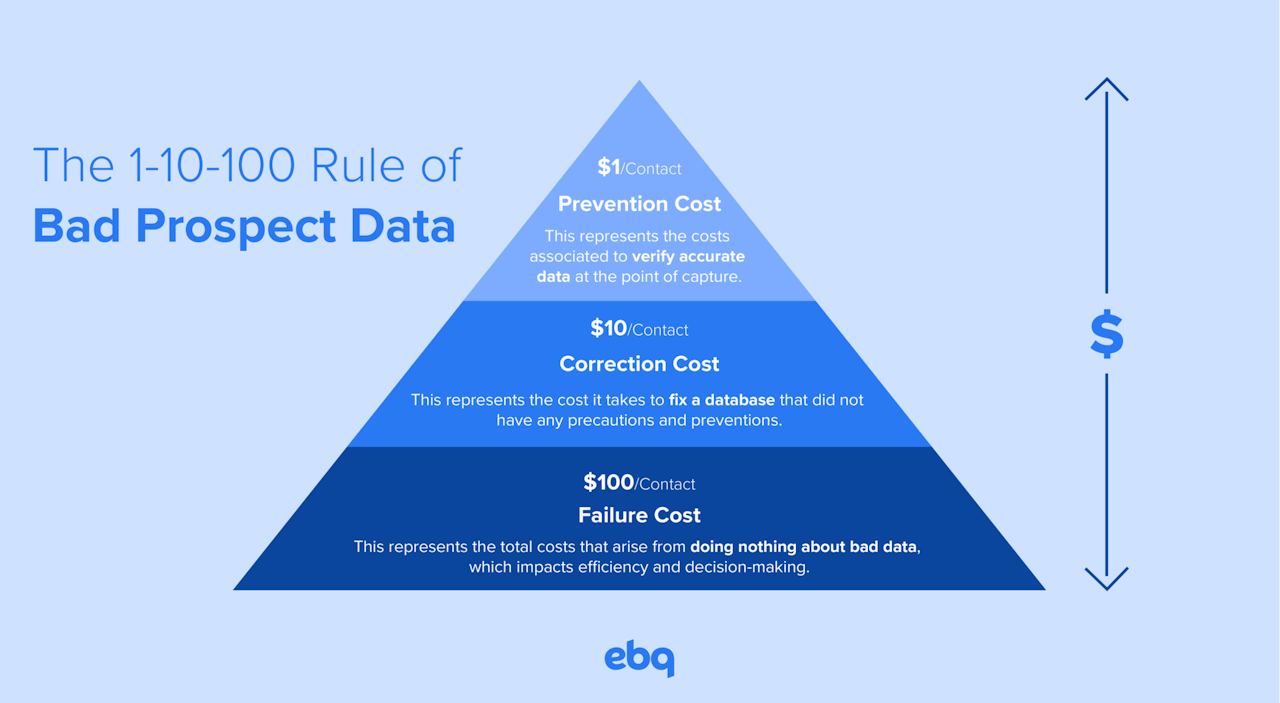
The trickle-down effects of bad data can be catastrophic; sales intelligence can help avoid them.
More Personalization
Today’s B2B buyer demands personalization, and they’re unwilling to tolerate companies who don’t make the effort to provide it.

Sales intelligence gives sellers the data they need to make the kinds of meaningful, personalized connections that prospects and customers have come to expect.
Improved Sales Performance
Sales intelligence helps sales reps perform better at every stage of the sales process.
Sales intelligence has a particularly significant effect on prospecting. With the right data, sales reps can ensure they reach out to the right prospects at the right time with the right approach.
It also saves sales reps’ time by giving them immediate access to high-impact data, which ultimately improves their productivity.
Sales intelligence gives sellers the personalized insights they need to move deals forward during the later stages of the sales funnel, when prospects are making consequential decisions.
And a robust sales intelligence process can also highlight which areas of the sales funnel may need more attention or optimization, allowing sales reps to pinpoint bottlenecks and challenge areas.
Insight Into Buyer Behavior
Sales intelligence platforms can give sales reps otherwise hard-to-get access to information about buyers’ intent. They do this by collecting data about buying signals.
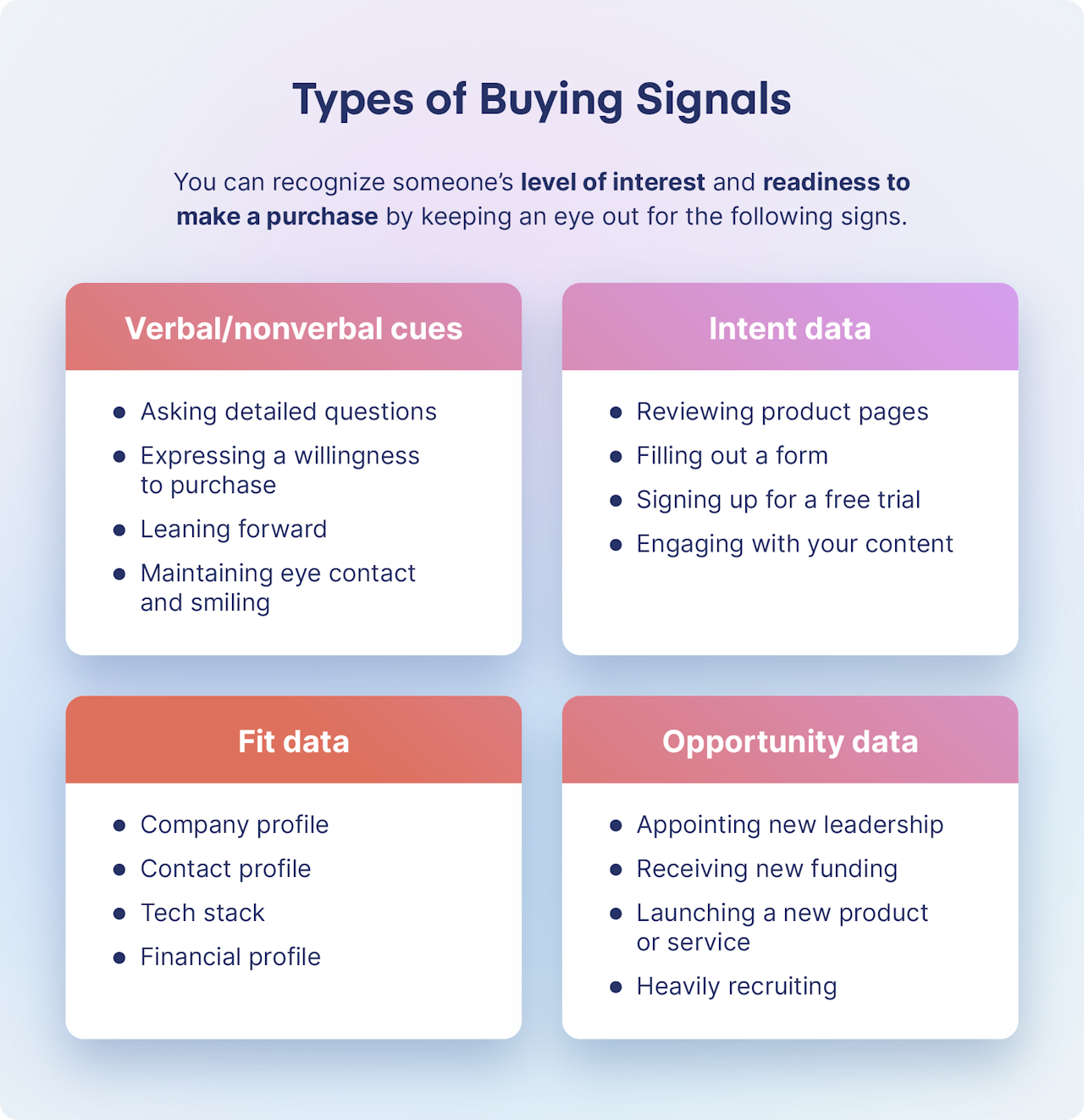
Buying signals help sales reps know how ready (or not) a prospect feels to make a purchase or receive outreach from a rep.
Faster Sales Cycles
All of these improvements help reduce the amount of time each prospect spends in the sales cycle. A shorter sales cycle boosts revenue and improves the bottom line.
It’s important to note here that “shortening the sales cycle” really means making it only as long as it needs to be for your target buyer.
In other words, the goal is not so much to shorten it for the sake of shortening it; instead, sales intelligence helps teams shave off unnecessary time in the cycle so that it’s optimized and frictionless.
The Essential Components of Sales Intelligence
Any effective sales intelligence program should contain at least the following essential components.
Data Gathering
Data gathering is the backbone of sales intelligence.
Also sometimes called data collection, this is the process of obtaining data to build a prospect and customer database. Existing CRM data should be included in this step of the process, as well as additional data enrichment, social media research, competitor intel, market insights, and more.
For some contacts, sales intelligence will help you build your profile from scratch.
For existing prospect/customer profiles, sales intelligence can provide data enrichment. Data enrichment is the process of adding new information and data to your existing B2B database. 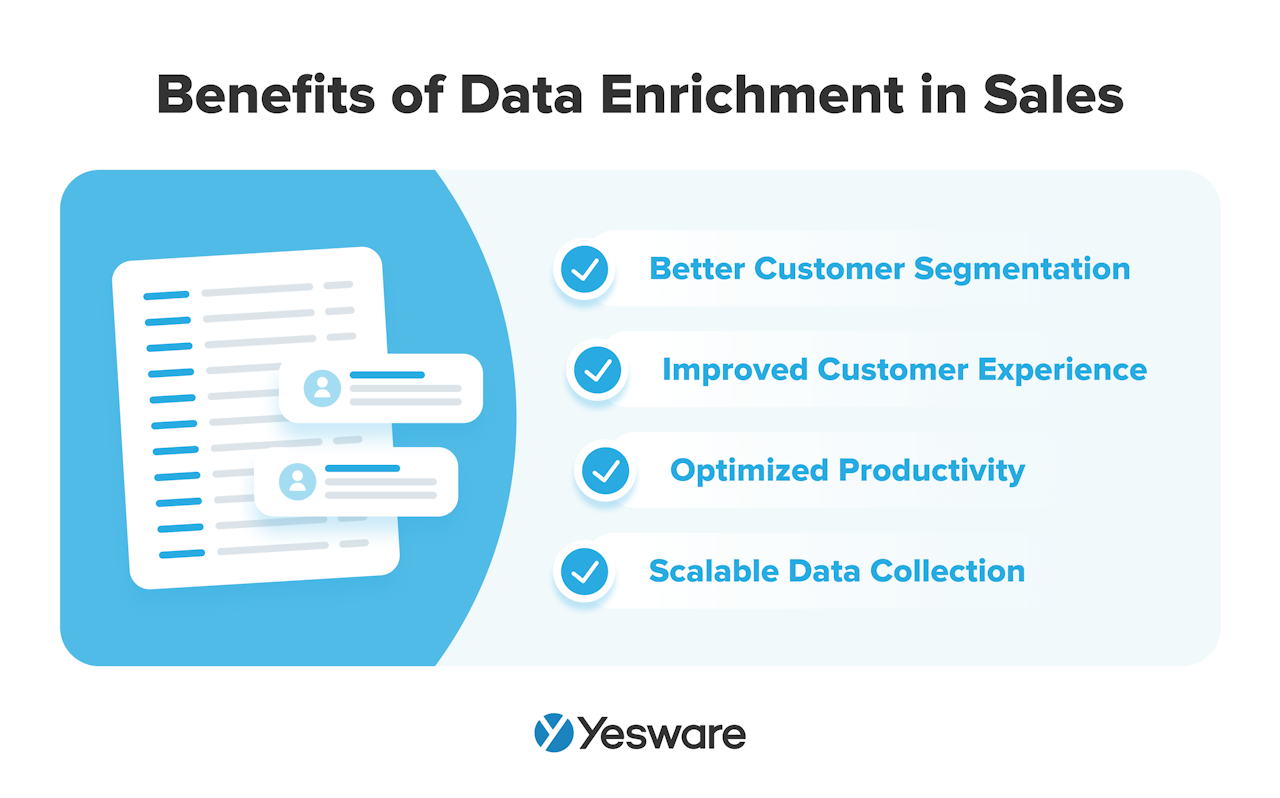 Sales intelligence platforms automate the process of gathering and enriching data and updating the CRM accordingly.
Sales intelligence platforms automate the process of gathering and enriching data and updating the CRM accordingly.
Data Analysis
Data analysis is also an umbrella term and encompasses a range of processes like identifying patterns in data, anticipating market trends, and identifying buying signals. Sales intelligence platforms can help sales teams gain access to the data they need for these kinds of analyses.
Sales reps and marketers can also gain actionable insight by asking for and analyzing customer feedback.
And, for teams that have these capabilities, AI and machine learning can offer even further analytical insight that can help drive seller behavior and optimize their sales efforts.
Effective data analysis driven by sales intelligence has a number of significant business impacts. Not only does it help create more accurate sales forecasts, it also subsequently helps sales teams prioritize and allocate their resources more effectively.
Lead Generation
Sales intelligence tools can give salespeople a huge leg-up when it comes to lead generation.
Through data analysis, sales reps and marketers can identify potential leads based on a thorough, data-driven ideal customer profile (ICP) and buyer personas. 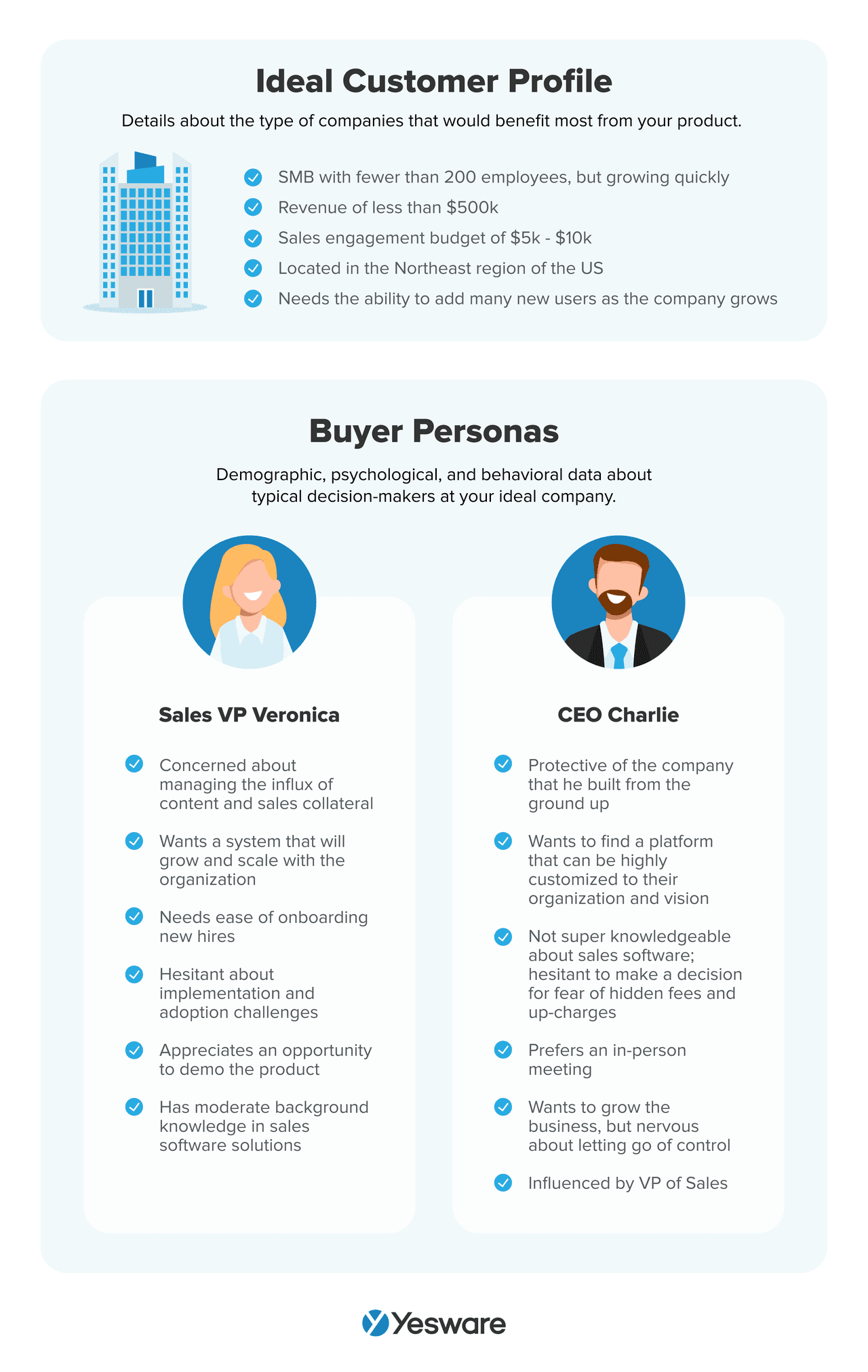
Competitive Analysis
Sales intelligence isn’t all about your business’s lead list; it’s also about knowing your competition and using that intelligence to edge them out.
Sales intelligence helps sales reps understand the specific strengths, weaknesses, and unique selling points (USP) of each of the competitors in their market. Its tools can provide data on things like competitor products’ features and benefits, their pricing strategies, positioning in the market, and customer reviews.
Personalization
It’s already been mentioned, but it’s worth repeating because it’s that important — buyers know that sales reps and marketers have the ability to access their information, and they expect you to do so — as long as it benefits them.
That means they have high expectations for a personalized, highly relevant, value-driven buying process.
The more sales reps know about a prospect’s interests, pain points, preferences, and previous interactions with their brand, the better they can build rapport and target their pitch accordingly.
The result will be stronger relationships and higher conversion rates.
Sales Forecasting
Sales forecasting is the process of using historical sales data and predictive analytics to estimate how much revenue a company will generate during a future time period. This is important for resource allocation and investors (among other benefits). 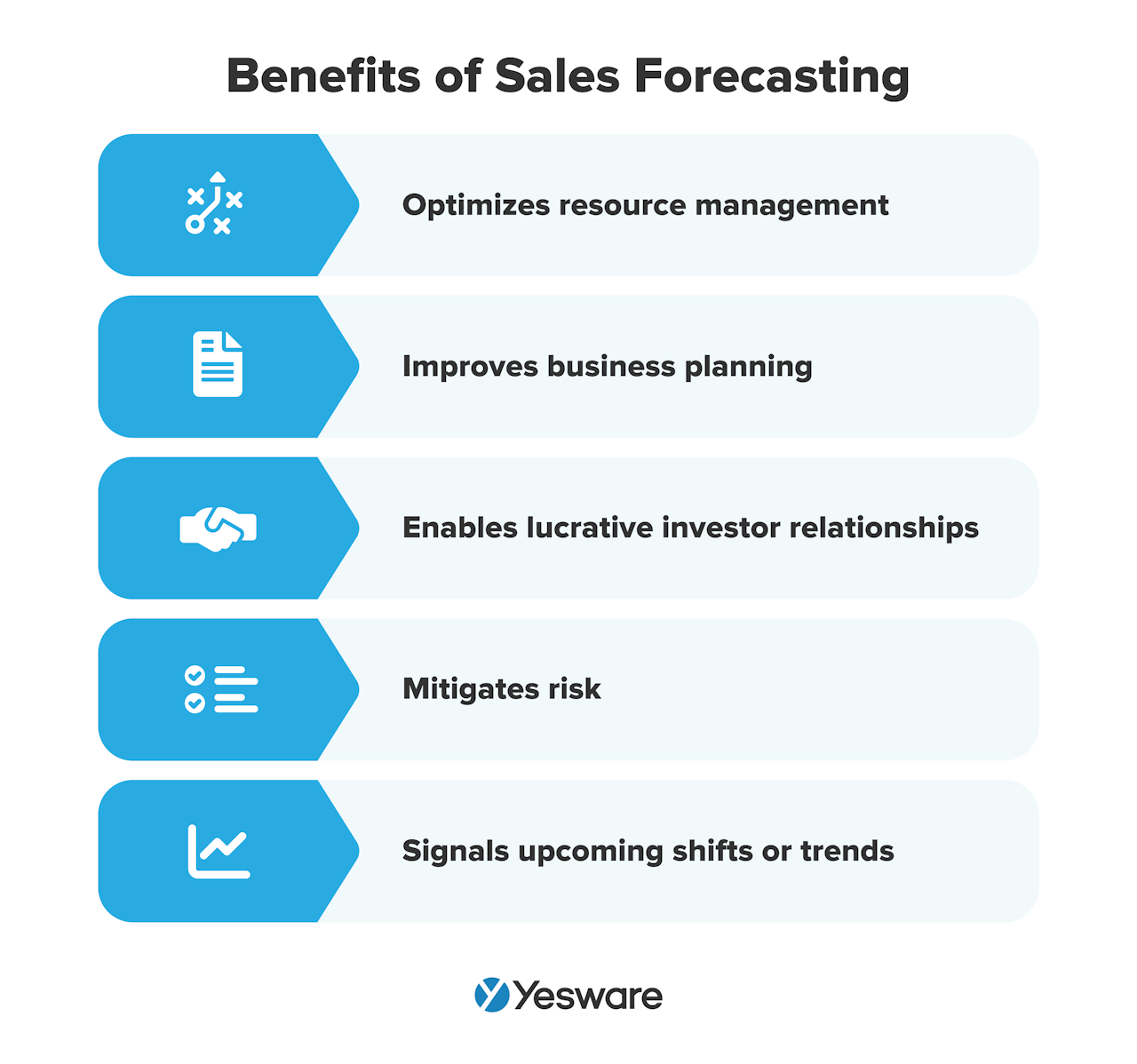 Sales intelligence can contribute to more accurate sales forecasting by analyzing historical data, market trends, and other relevant factors.
Sales intelligence can contribute to more accurate sales forecasting by analyzing historical data, market trends, and other relevant factors.
Customer Retention
Sales intelligence helps improve customer retention by enabling sales reps to track valuable information about customer behavior, interactions, and satisfaction rates. This empowers them to address issues proactively and strategize ways to increase customer loyalty.
Sales Enablement
Sales intelligence can be a huge component of an effective sales enablement program. This refers to the practices, processes, tools, and resources sales teams are provided to improve their productivity and close more deals.
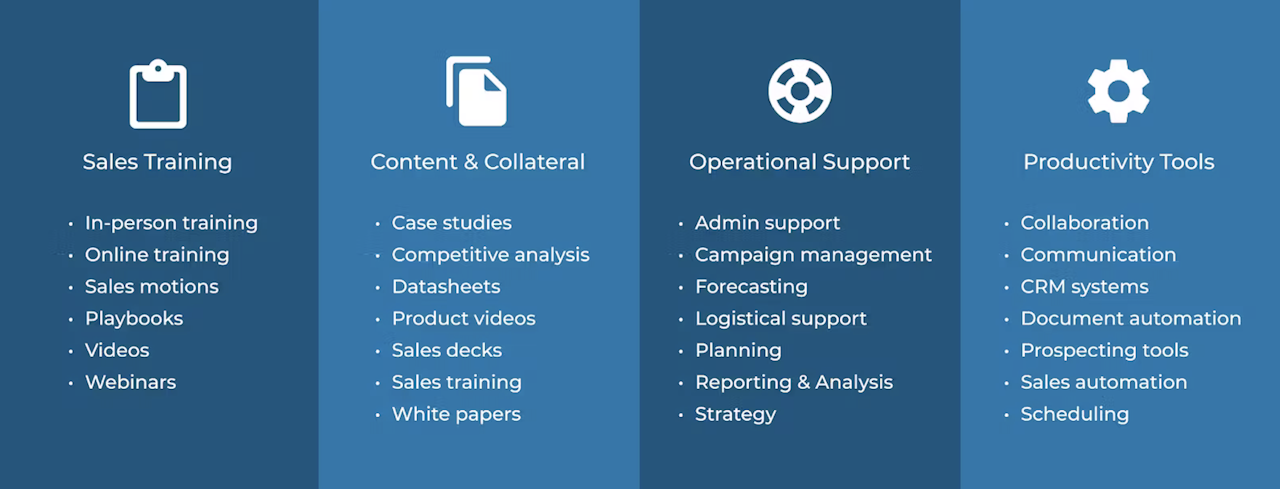
Sales intelligence tools provide sales teams with the information (e.g., product information, competitive analysis, sales scripts, customer testimonials, results, etc.) and data they need to engage with prospects productively at each stage of the sales cycle.
Tip: Find out what teams are doing right in the sales process to see results, based on real data.
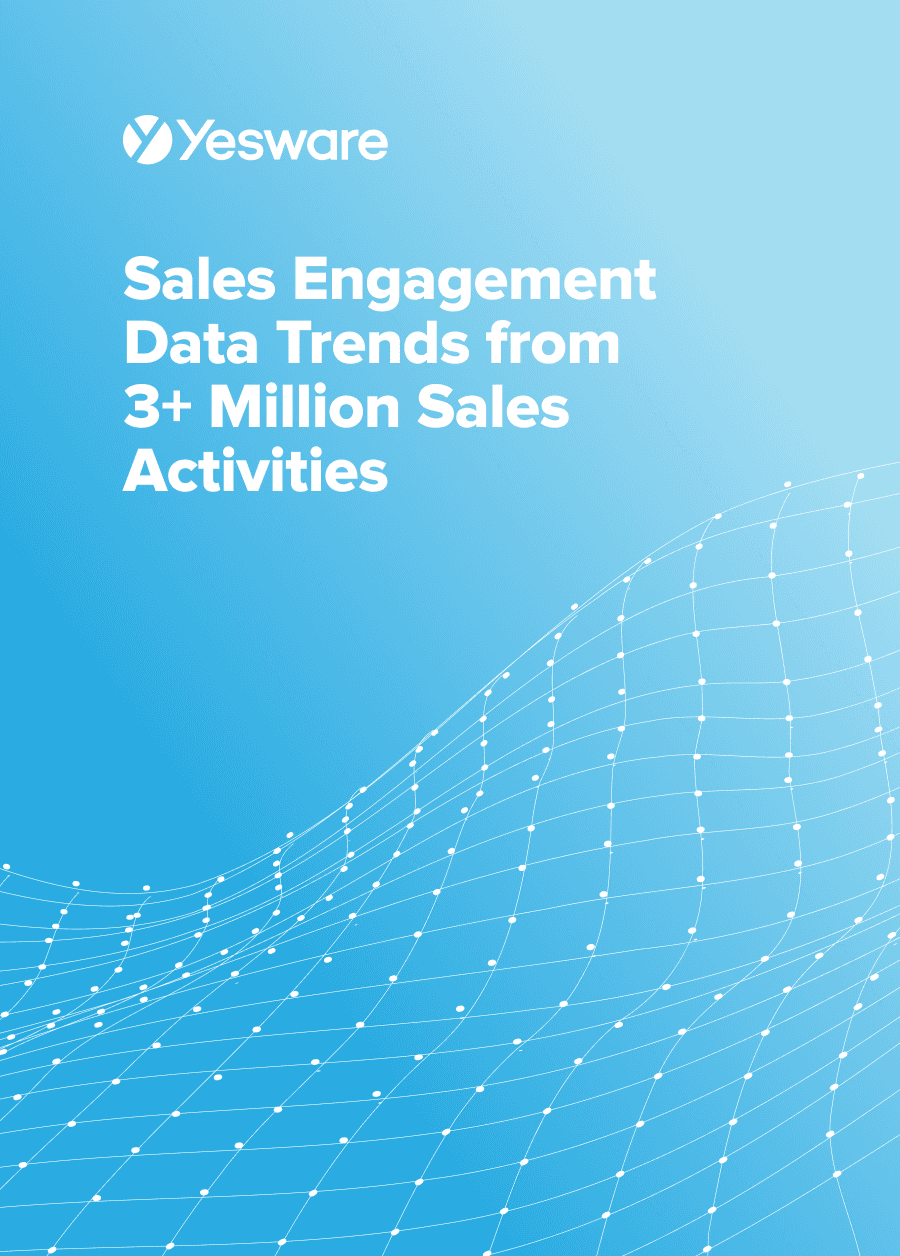 Sales Engagement Data Trends from 3+ Million Sales ActivitiesLooking at millions of tracked email activity over the past few years, this ebook is filled with our top studies and findings to help sales teams accelerate results.
Sales Engagement Data Trends from 3+ Million Sales ActivitiesLooking at millions of tracked email activity over the past few years, this ebook is filled with our top studies and findings to help sales teams accelerate results.
The Role of CRM in Sales Intelligence
High-quality sales intelligence platforms should integrate seamlessly with your customer relationship management (CRM) systems.
The integration/implementation process may vary depending on your existing tech stack and chosen sales intelligence platform, but it’s important that the CRM and sales intelligence platform have the ability to “talk” to each other so that sales reps have access to the most up-to-date, relevant prospect information.
In other words, the CRM should give sales reps the visibility they need into all of that high-value data.
The CRM also “talks back” to sales intelligence and enhances it, by allowing sales reps to track details of their interactions with prospects throughout the sales process.
Many CRM systems also give sales and marketing teams the opportunity to create insightful, easy-to-read reports that collate all of the sales intel.
It’s also important (though scary) to note that even the most powerful CRM system can only take you so far, knowing that B2B business data decays at a shocking rate.
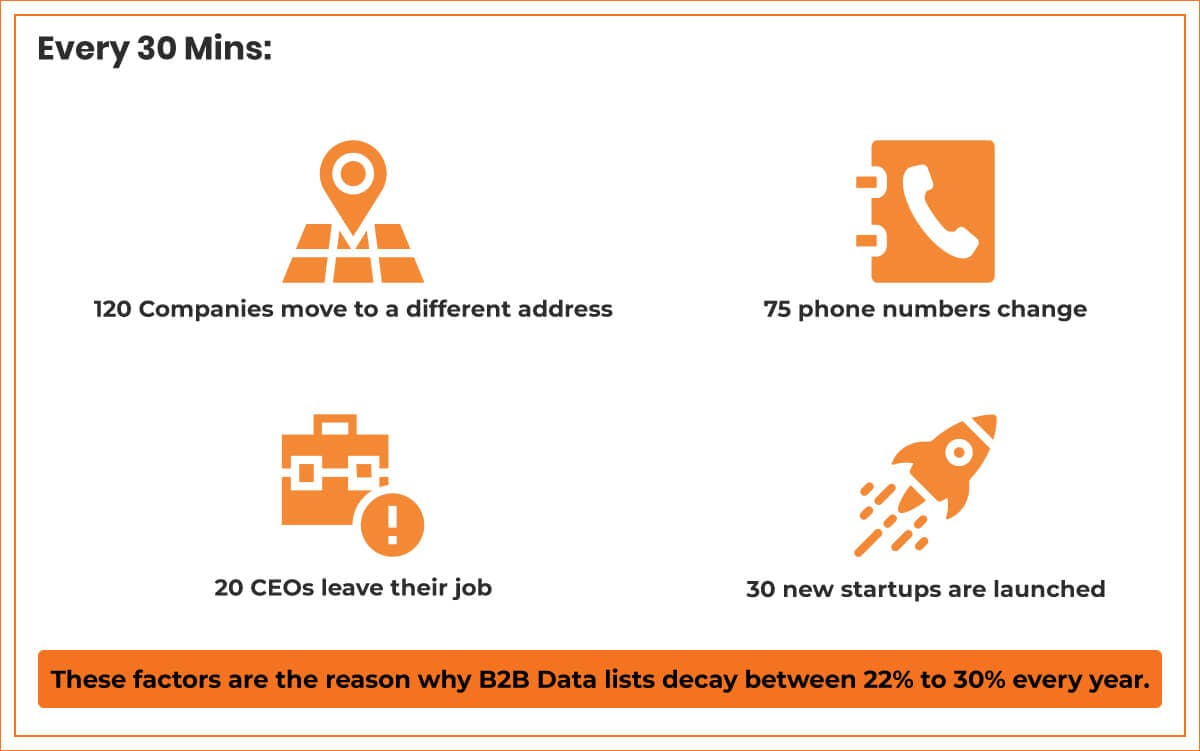
Sales intelligence platforms automate the process of scanning for new information and updating the CRM accordingly.
A complete integration between CRM and sales intelligence maximizes the value of both systems by saving time and improving the results of your outreach efforts.
How to Use Sales Intelligence to Win More Deals
Sales intelligence benefits all stages of the sales process. From prospecting to pitching to negotiating and closing, sales intelligence can improve sales performance across the board.
Easily Find Qualified Accounts
Sales intelligence helps you quickly identify accounts that most closely match your ICP.
Some sales intelligence platforms can even do the work of generating these best-fit leads for you, and can also sometimes allow you to use sophisticated and detailed filters (e.g., date of last funding, recent leadership changes) to help comb through your lead list. The amount of time this automation can save reps is immeasurable.
Sales intelligence can also help your lead scoring be more thorough. 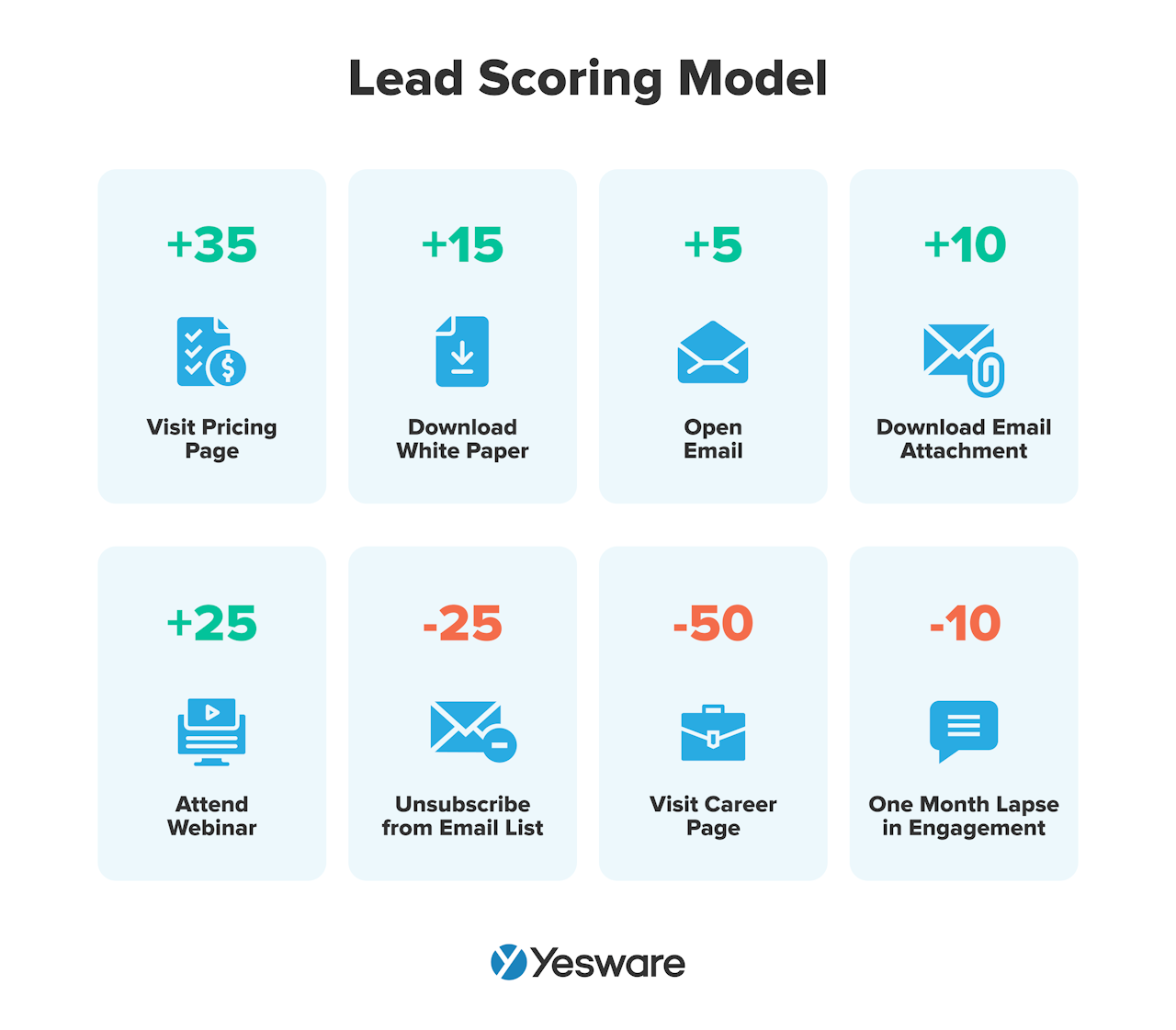 The more complete your sales intelligence is, the better your sales team can anticipate when and how to reach out to each lead when their buying signals indicate readiness.
The more complete your sales intelligence is, the better your sales team can anticipate when and how to reach out to each lead when their buying signals indicate readiness.
Streamlines Your Tech Stack
A good sales intelligence platform can help coalesce all of the information you need into a streamlined, accessible data hub.
This saves your sales reps time and increases sales productivity.
It can also improve cross-team communication and collaboration.
Discover Your Total Addressable Market
Your Total Addressable Market (more commonly known as TAM) is the total amount of possible revenue your sales team could generate with your product or service if there were no other mitigating factors like competitors, market disruptions, buyer preferences, etc.
Sales intelligence helps define your TAM, SAM, and SOM (SAM being the Serviceable Addressable Market and SOM being the Serviceable Obtainable Market). These metrics help ensure your teams’ resources are allocated appropriately and that you’re maximizing your revenue opportunities. 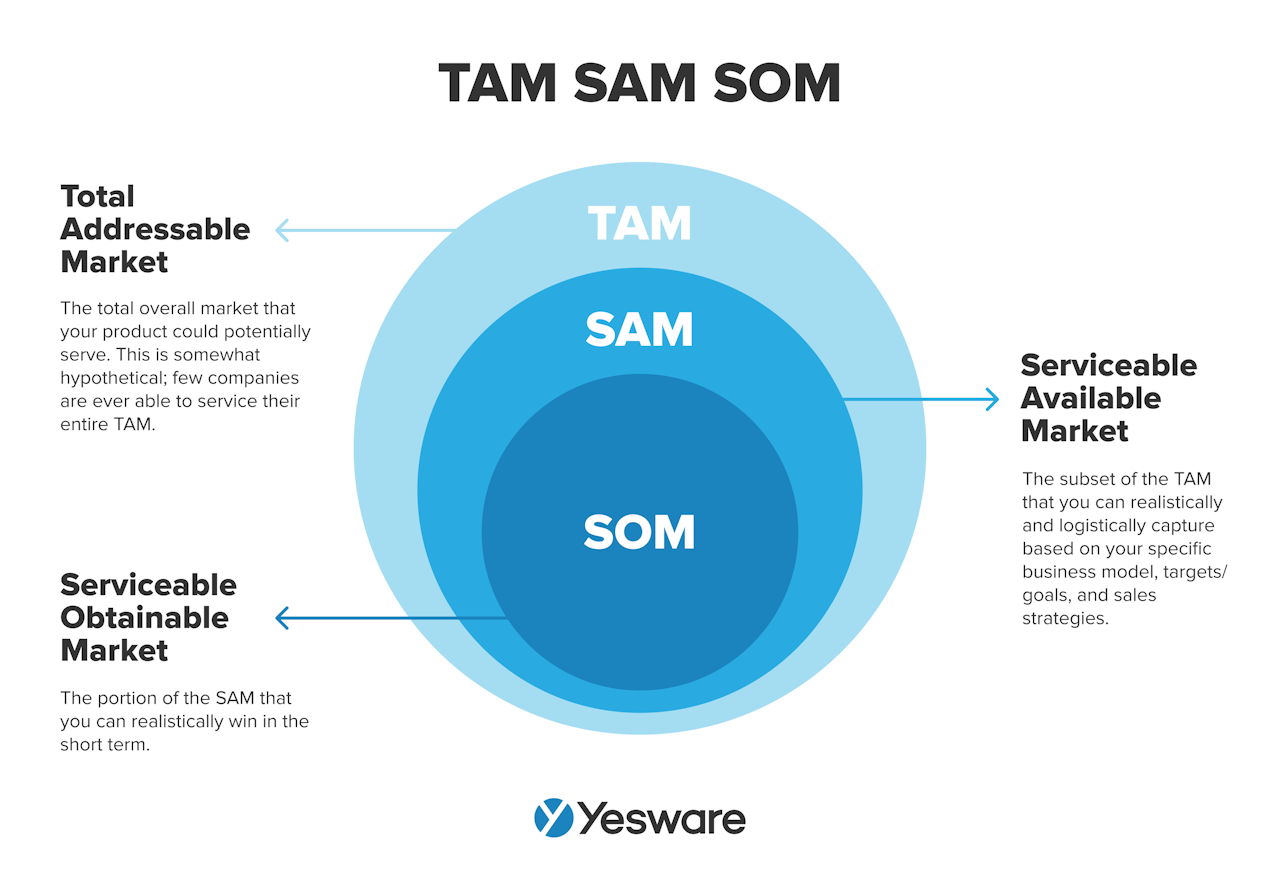
Determine and Track Buying Signals
Sales intelligence helps teams monitor their company’s websites, social media pages, and email campaigns to pinpoint the buying signals that indicate readiness to engage or purchase.
This information is highly valuable for SDRs who can’t afford to reach out at the wrong time.
Good sales intelligence platforms will even send automated alerts to reps when a sales trigger event occurs, like when a prospect opens an email or downloads an attachment, so the rep can follow up when the lead is already highly engaged.
There’s data to back up this need for speed. Research shows that the faster a rep reaches out after a lead engages, the more likely they are to qualify the lead and ultimately close the deal.
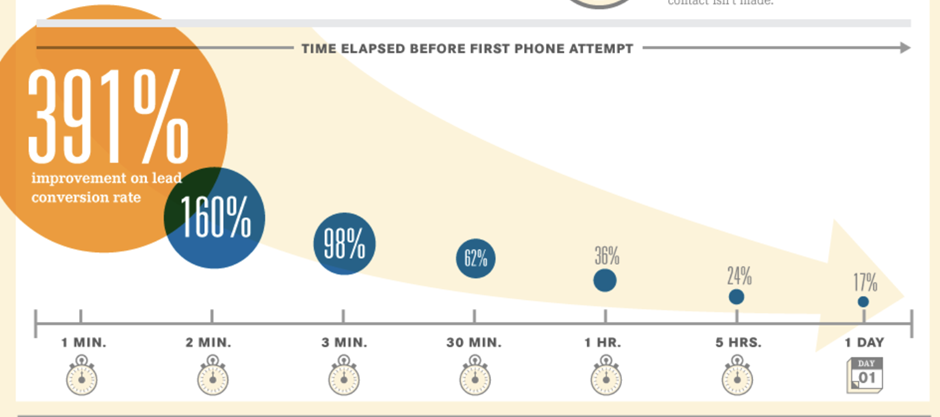
Sales intelligence can also help sales teams identify more nuanced intent data, like recent funding, mergers, or acquisitions, new hires, etc. All of this information is relevant when it comes to generating and prioritizing lead lists, and personalizing each pitch as they move further down the funnel.
Find and Engage With Decision Makers
Good sales intelligence can help sales teams quickly identify the decision makers within a prospective company with details like their name, job title, email address, phone number, and more.
This helps sales reps save time by allowing them to go directly to the people with the purchasing power.
Enhance the Customer Experience
Sales intelligence helps sales reps know exactly what resonates with each individual prospect, so they can target their approach throughout every stage of the sales funnel. Great sales intelligence platforms offer insight into buyer preferences on email, social media, phone calls, etc., so you can curate the perfect messaging approach and sales cadence.
It’s important to note here that sales intelligence is more than just enriching lead profiles so sales reps know as much as they can (though the importance of that cannot be understated!). It’s also as much about making sure those profiles stay updated regularly.
Out-of-date data used deep into the sales funnel can be catastrophic to a deal’s success, and sales intelligence platforms give sales reps assurance that their data is as up-to-date as possible.
Improve Your Sales Strategy
In addition to helping sales reps navigate the day-to-day responsibilities of their role, sales intelligence also helps sales leaders navigate big-picture sales strategy and forecasting.
The overall goal of sales intelligence is to drive revenue growth, so sales leaders should work to create SMART sales goals using their sales intelligence with that in mind. 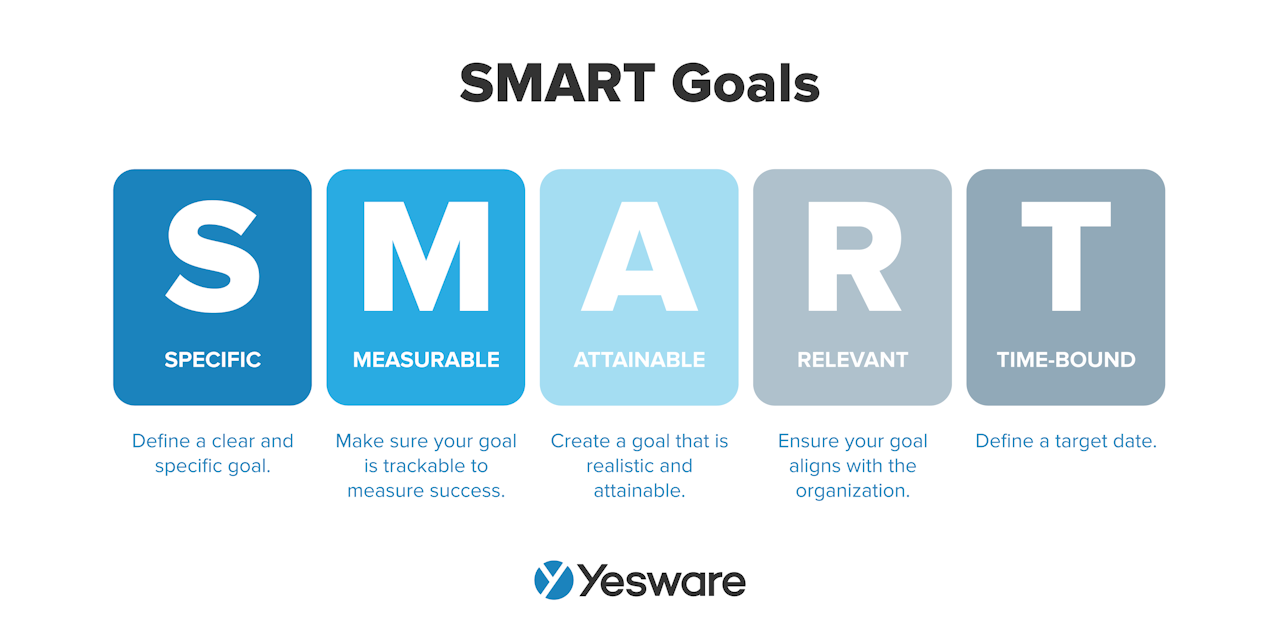
Yesware Can Help
Yesware is sales engagement made easy, delivering real-time alerts to sales reps every time prospects open an email, read an attachment, or schedule a meeting with you.
![]()
And, with a database of over 100 million B2B leads, our Prospector offers complete access to high-quality, enriched contact data that will instantly boost your sales intelligence.
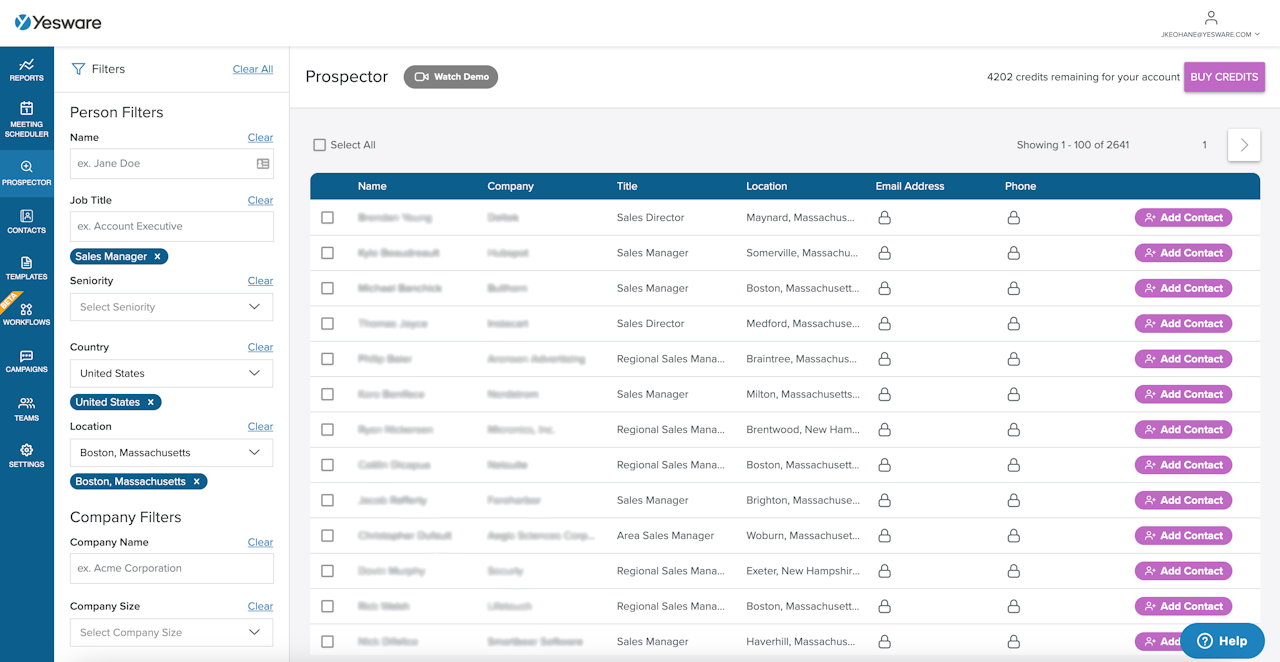
Yesware automates every step of the process (even GDPR & CCPA compliance), so you can stop wasting time on manual data and sales intelligence management and start making the kinds of real connections that make sales.
Do you have a sales intelligence practice for your team? What kind of sales intelligence is most impactful for your team’s sales process? How can you enrich your existing sales intel?
Get sales tips and strategies delivered straight to your inbox.
Yesware will help you generate more sales right from your inbox. Try our Outlook add-on or Gmail Chrome extension for free, forever!
Related Articles
Jenny Keohane
Jenny Keohane
Jenny Keohane
Sales, deal management, and communication tips for your inbox

